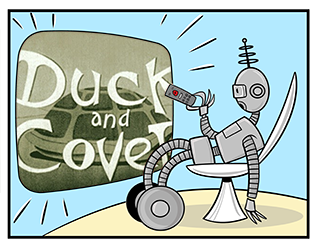Duck and Cover

Produced by Ray Maurer and Anthony Rizzo for the U.S. Federal Civil Defense Administration, Duck and Cover (1952) was released at a time of heightened tension between the United States and the Soviet Union. In 1949, the Soviet Union’s successful detonation of its first atomic bomb had eroded the United States monopoly on nuclear weapons. Ten months after this film was introduced to classrooms around America, the United States successfully detonated a thermonuclear weapon (the “hydrogen bomb”) that was approximately 1,000 times more powerful than the bomb that devastated Hiroshima. A nuclear arms race was officially underway.
If you search for more information about this movie, you might notice that Wikipedia explicitly rejects the notion that Duck and Cover is a propaganda film. You might be wondering why the online encyclopedia would make this claim.
According to the Wikipedia page, the movie should not be interpreted as propaganda because it was a sincere attempt to teach Americans what steps they could take to improve their chances of surviving a nuclear war. Many of the movie’s recommendations seem far-fetched or even laughable, but its fundamental message (“seek shelter immediately in the event of nuclear attack”) continues to be good advice.
There is a good chance you would not survive a nuclear blast even if you were to seek shelter, but there is an even greater chance that you would die if you failed to duck and cover.
Is Wikipedia correct? Is it unfair to characterize Duck and Cover as a propaganda film? The answer depends on how you define the term ‘propaganda.’
The authors of the Wikipedia entry seem to be operating under the impression that propaganda is always a bad thing. This is a widespread misconception. Persuasive techniques can be used to accomplish terrible objectives, and some propagandists use disinformation and falsehoods to sway public opinion, but propaganda is not intrinsically evil and it is not necessarily dishonest.
The Institute for Propaganda Analysis defines the term in this way:
“Propaganda is the expression of opinions or actions carried out deliberately by individuals or groups with a view to influence the opinions or actions of other individuals or groups for predetermined ends through psychological manipulations.”
Duck and Cover is a well-made film which use multiple persuasive tactics to convince audiences that they should immediately seek shelter in the event of a nuclear blast. It is not evil, but it is propaganda.
References
1 Wikipedia Contributors (2018, August 11) “Duck and Cover (film),” Wikipedia.
